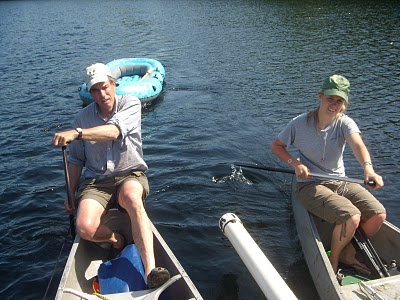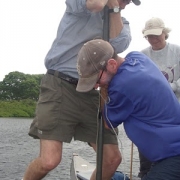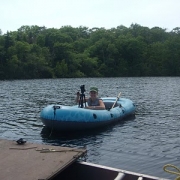You are here
Paleoecology - in the field, in the lab, and on film
Hi, my name is Allison and I am working on Paleoecology with Wyatt Oswald.
About 5,000 years ago, all the Oaks and Hemlocks disappeared from New England, rapidly changing our ecosystem. Today, all the Oaks are dying on Martha's Vineyard in a similar fashion. Before our current ecosystem is radically altered, we would like to figure out what is causing this phenomenon. In order to do this, we travel to ponds across New England collecting sediment cores.
 The cores can be viewed like a timeline (the deeper the core the farther back in time). We then use the mud from the cores to determine organic content and pollen grains from species that existed at different points in time. Currently, we are still collecting data to determine what caused the Oak and Hemlock die-off. We are leaning towards climate change, but don't have an official answer yet.
The cores can be viewed like a timeline (the deeper the core the farther back in time). We then use the mud from the cores to determine organic content and pollen grains from species that existed at different points in time. Currently, we are still collecting data to determine what caused the Oak and Hemlock die-off. We are leaning towards climate change, but don't have an official answer yet.
 So far this summer, we traveled to Martha's Vineyard to collect two sediment cores to analyze in the lab. My job for the project besides day-to-day lab work is to shoot a documentary on the subject that will better convey the knowledge collected to the general public. Although the beginning of the summer was primarily spent collecting cores and learning how to do lab work, the rest of my summer will mainly be spent in the lab. I spend my time cutting up meter-long sediment cores into centimeter sections. I then proceed to take samples of these sections and place them in crucibles. The crucibles are weighed and baked (first at 95 degrees C and then at 550 degrees C) to determine organic content. When I am not completing those tasks, I am either capturing or editing footage for the documentary.
So far this summer, we traveled to Martha's Vineyard to collect two sediment cores to analyze in the lab. My job for the project besides day-to-day lab work is to shoot a documentary on the subject that will better convey the knowledge collected to the general public. Although the beginning of the summer was primarily spent collecting cores and learning how to do lab work, the rest of my summer will mainly be spent in the lab. I spend my time cutting up meter-long sediment cores into centimeter sections. I then proceed to take samples of these sections and place them in crucibles. The crucibles are weighed and baked (first at 95 degrees C and then at 550 degrees C) to determine organic content. When I am not completing those tasks, I am either capturing or editing footage for the documentary.
So far I have learned a lot. Firstly, I have learned that mud can be interesting! I am excited to make the documentary because I think we can really turn this into something people will want to get involved in. I have also learned how to turn everyday items into lab materials (like beard trimmers and spatulas). Overall though, I have learned that science is hard work and an extremely long process.
 I know my work will take most of the summer and may not even produce concrete results. However, looking at the big picture I know all of my work is important and that is what keeps me going on a day-to-day basis.
I know my work will take most of the summer and may not even produce concrete results. However, looking at the big picture I know all of my work is important and that is what keeps me going on a day-to-day basis.
For the rest of the summer my project will just consist of repeating the lab steps for all the sediment cores at both Martha's Vineyard ponds. I will also have a rough cut of the documentary done by symposium to show everyone. Maybe we will even be able to make a direct connection between the Oak die-off and global warming!
UPDATE: Here is the film!

